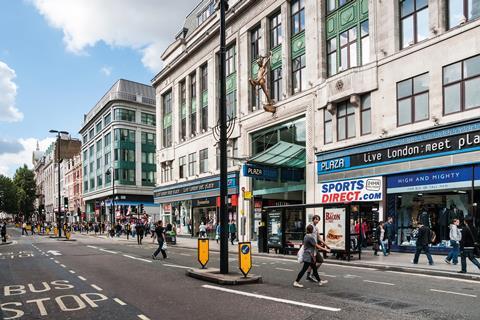As someone who regards shopping as a leisure activity, I found it fascinating to interview retail guru Rebeca Guzman Vidal, Chelsfield Group Head of #Retail for my podcast at a time when, as she says, ‘everything in retail has changed’.

Listen out for some great insights into why experiences, reimagining, community, placemaking and culture are going to be crucial to the future of retail and our high streets. She also offered some useful insights into why we will see landlords and tenants working more closely in partnership and why the Chancellor should rethink the abolition of tax free shopping.
There are some great ideas on how to regenerate our high streets and shopping areas (including how we could increase dwell time by making them dog and child friendly!). In this context she cites as an example Camp, a venture-backed ’family experience store’, basically a toy store with interactive play spaces. This venture which was started well before Covid-19, is a great example of experiential retail.
The stores sell toys alongside immersive themed spaces that change every few months. Anything similar for dogs would be greatly appreciated! We also touched on the idiosyncratic Japanese cat and other animal themed cafes which could certainly enliven our beleaguered high streets.
Could these overcome health and safety obstacles to catch on in the UK, as after all we are a nation of animal lovers?
Listen to the podcast here:
To further illustrate the direction of travel for experiential retail, Guzman Vidal has drawn my attention to some other examples. Against a backdrop of retail closures, Avon, the beauty company has, after 135 years of door-to-door and now online selling, opened its first ever bricks and mortar store.
It is an immersive experience centre, called Studio 1886, paying homage to the year the company was founded. Located in Koreatown, Los Angeles the 19,000 square foot space, on two floors, will provide a playground for beauty product aficionados and will showcase Avon’s top products.
Then you have Lynk & Co, a car company which is anything but typical and is trying very hard to do things differently. According to their CEO, cars are only used 4% of the time on average. Lynk & Co wants to change that by letting owners easily rent their cars for the remaining 96% of the time. They are focusing on vehicle sharing rather than individual ownership, and aim to attract customers through their social clubs.
Counterintuitively, the first club is in bicycle-loving Amsterdam. Called The Amsterdam Club, it really is more a social hangout than a car showroom. The venue is designed to attract customers who believe car ownership is a thing of the past and that car parks should be reclaimed for more exciting uses. These are social spaces rather than car showrooms and will feature regular experiences.
These could range from local DJs sessions to film screenings, cooking classes, and jewelry making workshops. The car on offer is discreetly displayed and is available for viewing, but is hardly centre stage.
Guzman Vidal reckons that, going forward, retail will occupy just 50% of our high streets. So how will town centres respond to the challenges of a retail-lite future?
In Stockton-on-Tees there are plans afoot to shrink the town’s oversupply of retail space by demolishing a large shopping centre. This will not only remove surplus retail but will also have the benefit of opening up the town to face the river. Under the plans, the site, which is equivalent to three times the size of Trafalgar Square, will accommodate a riverside park and offices.
The park will feature public artwork and green spaces for the community to enjoy. A bridge structure will enable the park to span a section of road to permit uninterrupted access to the waterfront. The council is planning to submit a bid for £21million from the Government’s £1billion Future High Streets Fund.
What do the experts think of the proposals? Bill Grimsey, author of the Grimsey Review, commented, “I visit a lot of councils and as far as I’m concerned Stockton-on-Tees Borough Council is one of the best in the country at understanding you have to reinvent your towns as places for people to come for reasons other than shops.
The fact is, shopping is totally different in the 21st century and it doesn’t require the traditional high streets of the past. What we do require are town centres with things like parks and great entertainment, great attractions, health, and housing.’ That sounds like an unequivocal vote of confidence!

Meanwhile in London, Westminster Council unveiled exciting new plans for Oxford Street. It is the 82 ft, climbable hillock overlooking Marble Arch that has attracted much press attention. It gets back to the importance of creating experiences and ‘grammable’ moments to lure shoppers back to the west end post Covid-19. ‘Marble Arch Hill,’ a scaffolded structure, decorated with grass and trees, will operate for six months from this summer, and will feature a viewing platform and rooms for events and exhibitions.
Whilst Oxford Street attracted circa 200 million visitors a year pre Covid-19, numbers have plunged amid the absence of tourists and lockdowns. And now with at least a fifth of the stores on Oxford Street permanently shuttered, according to data from the New West End Company, a wider range of businesses are needed to reduce the reliance on retail.
In addition to visitor attractions, such as Marble Arch Hill, the Oxford Street Plan includes public realm improvements with more pedestrian space, pop-up parks, open-air theatres and other cultural and leisure activities. There will also be initiatives to reduce traffic congestion, improve air quality and repurpose redundant retail space.
Hopefully, we will see more F&B and places to sit and relax as mentioned by Guzman Vidal in our podcast.
Whilst there has been some criticism of the plans, including from my fellow Property Week columnist Steve Norris, who was critical of ‘building Alton Towers in the middle of a busy roundabout’, the fact that Marble Arch Hill has already attracted global media coverage is something of a success in itself.
Discussing the future of our town centres and high streets with Central’s Patricia Brown she reflected that these are all issues we discussed in our prescient ‘Big Think on the Future of London’ series of roundtables with Property Week back in 2012/2013.
As Brown says, ’I get what people say about the need for ‘experience’ as a part of the retail experience, though in fact that is a large part of the London story for the past few decades, delivered on various levels: making walkable, enjoyable, public spaces, creating events of different scales and building a symbiotic relationship with the wider cultural or dining offer.
Focusing on the experiential in retail is a good value add, but I question how much of a panacea it offers in a such a challenged environment, and consider who, in a world were hanging out with mates in Top Shop is no longer an option, we are creating an experience for? Answers on a postcard please!
Susan Freeman is a partner at Mishcon de Reya





























No comments yet